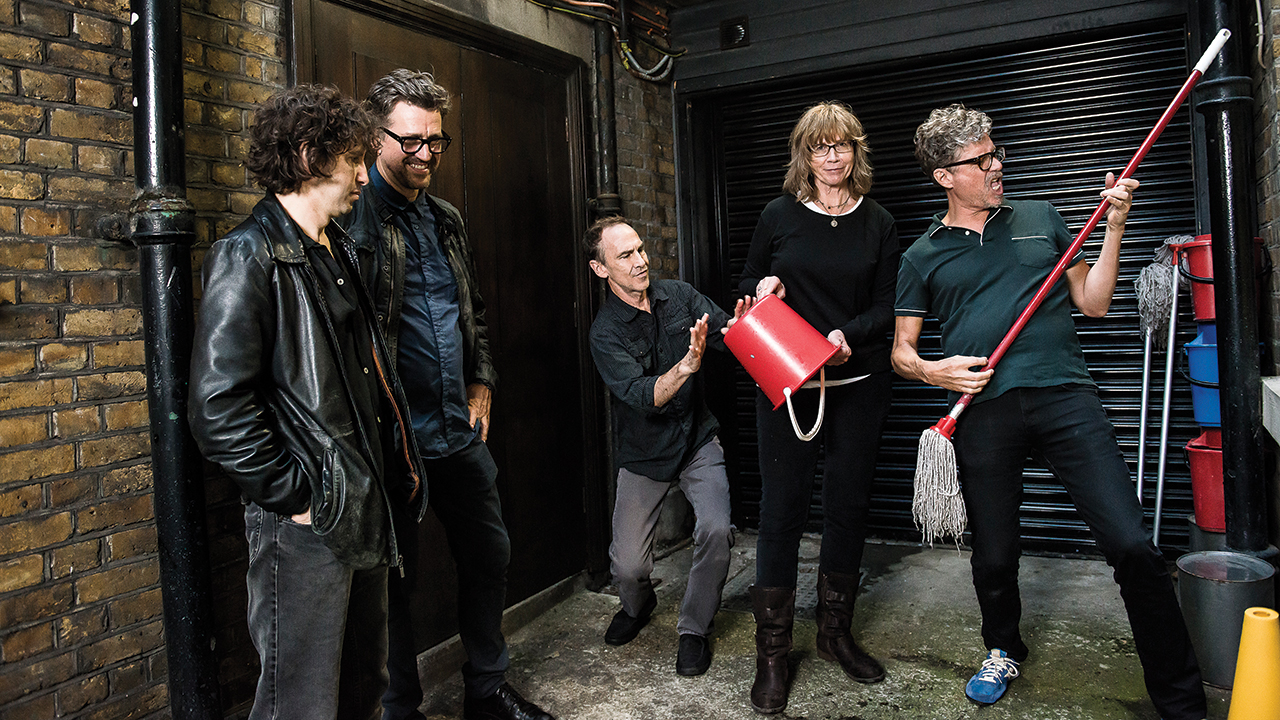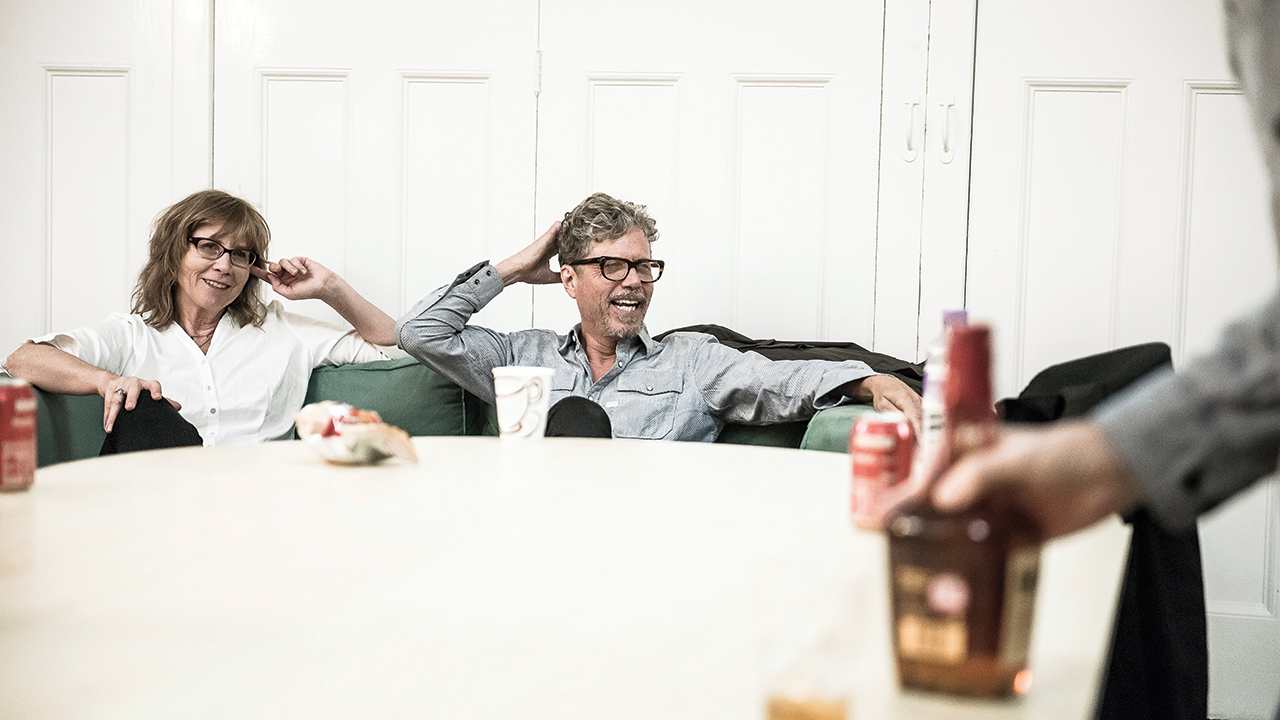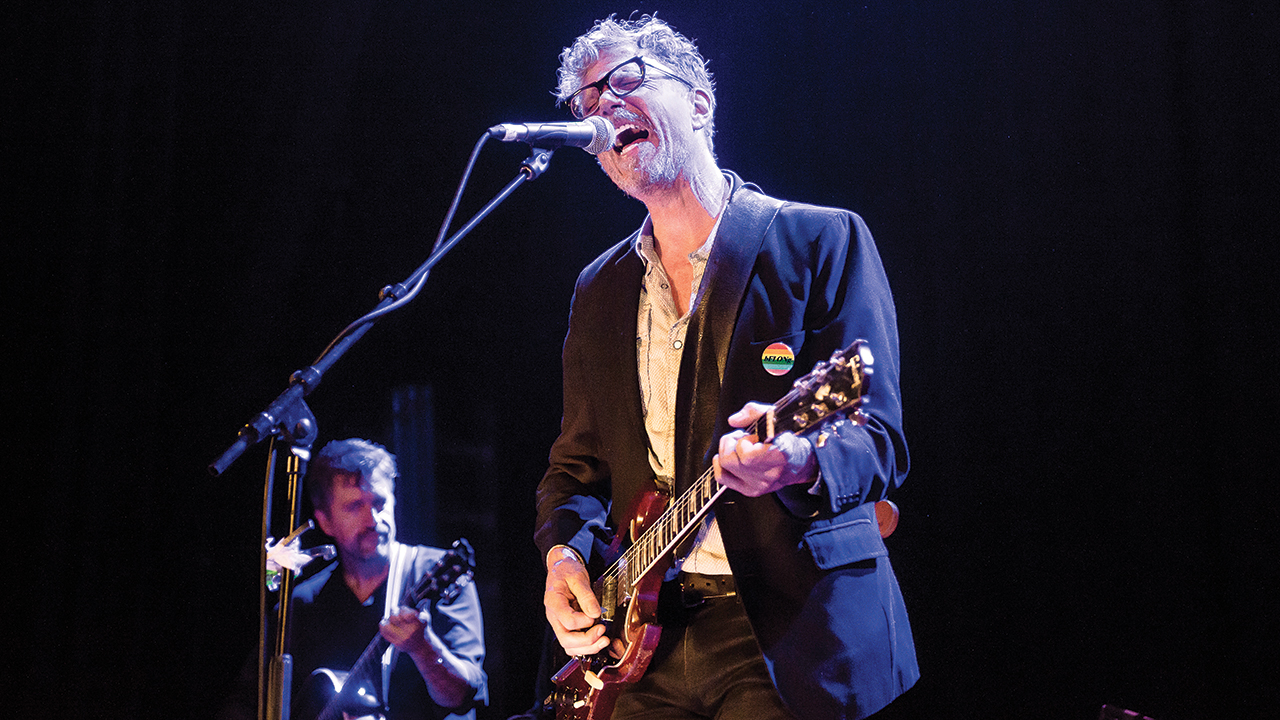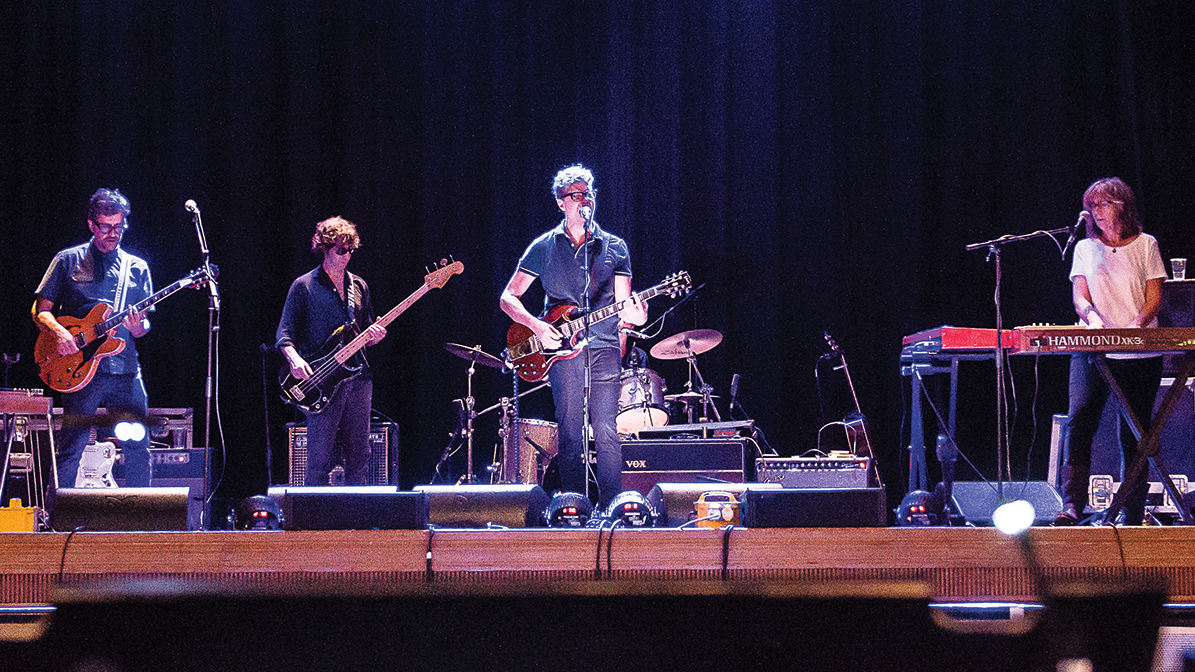Ray Davies is leaning on an old alley’s sooty brick wall, talking with his new friends The Jayhawks after their two-night London stand. Spying CR, he looks startled: his sessions with the American band at nearby Konk Studios were meant to be as secret as the Manhattan Project, but the cat has just leapt out of the bag.
Davies, mainman of The Kinks, is a fragile presence at 72, a childhood spinal injury perhaps contributing to his slightly bent back. His voice is husky and quiet, but retains his lifelong air of faint amusement. “Ray! Not saying goodbye?” Jayhawks leader Gary Louris chides as Davies tries to slip away into the London night. He ghosts up to shake hands delicately, then quickly disappears.
Although The Jayhawks are often credited with helping to kick‑start the Americana revival – a style wholly out of fashion when they formed in Minneapolis in 1985 – their country-rocking roots came mostly from their former co-leader, Marc Olson. Latest album Paging Mr. Proust, co-produced by peer and fan Peter Buck, instead leafs through Louris’s 60s rock influences. Its strong melodies, wistful harmonies and bittersweet nostalgia aren’t unlike The Kinks, making them inspired stand-ins to record with Davies. The fractious end of Olson’s second spell with the band in 2012 (more of which later) might also raise knowing smiles from Ray and Dave.
“I like Ray a lot,” Louris reflects when he’s gone. “He’s one of my heroes, and still is [after knowing him]. So it’s pretty cool when I look over and see him in the studio. I was a huge Kinks fan, from the early days in the 60s, and I saw them a lot in the 70s, when they came through Minnesota. I even had my Lola Versus Powerman record signed by them. Little did I know…”
“When we were working at Konk, we’d always get out of there 20 minutes before the Hope And Anchor closed,” recalls bassist Marc Perlman, the other original Jayhawk, “but they would be expecting us, so they’d stay open later. And then Ray would show up, and then it’s open till whenever, really. Everybody in Konk pretends they’re not impressed with Ray. ‘Oh, he’s just the old geezer who owns the studio…’”

It’s a day earlier, and soundcheck time at Islington Assembly Hall. Tim O’Reagan, Jayhawks drummer since 1995, hammers out a lonely beat onstage. Then new member Jeff ‘Chet’ Lyster walks out to pull beautiful country tones from his pedal steel, the only sound for a while as the glitterball turns in the near-empty 30s hall. Gary Louris croons Moon River when he arrives, then Karen Grotberg adds keyboards. Perlman, all in black with leather jacket and indoor shades, is the first visual sign of rock’n’roll. Louris is in unquestioned command.
Backstage seems designed to batter any vestige of mystique out of life on the road. The Assembly Hall is a great, council-owned venue and the dressing room’s mustard-yellow walls and sea-green sofa are soullessly municipal. When the band sit awkwardly round a boardroom table to be interviewed, Louris especially talks behind a tangible force field of reserve. The room’s stacks of bottled water and lack of alcohol recall the drink and painkiller addictions he detoxed from in 2012. “I never really liked the old rock’n’roll cliché,” he says. “I’ve never really felt like I was a rock’n’roller. I was never fascinated by the whole lifestyle. We were never built to be a party animal band.”
Jayhawks tours haven’t always been so tranquilly businesslike. “Why don’t you hit me?” were among Louris’s last words to Olson, according to the latter’s bitter 2014 interview with the Minneapolis Star Tribune. Olson had first left the band in 1995, before returning for reunion album Mockingbird Time (2011) and heavy-duty gigging till 2012. Olson’s description of his own behaviour in the interview sounds pretty poor, but not as poor for Louris, it would seem, as spilling to the press. ‘Picked up the afternoon paper/And went leafing through the local news,’ is how he starts recent song Lies In Black And White, a Dylanesque kiss-off to a familiar-sounding target: ‘Your words are twisted bitter/You duplicitous quitter.’
Louris and Grotberg both laugh knowingly at the idea that this is a portrait an old bandmate might recognise. “Oh really?” says Louris. “I diplomatically say it’s about the press in general. It can be construed as… but I don’t really comment on… it’s just one of those songs that came out a little less obtuse.
“There was an attempt to recapture something from the past that wasn’t there any more,” he adds of the reunion. “If I blame anybody, it’s maybe myself, for thinking it was a good idea. This is probably the best group of people, as far as getting along. It’s interesting for Chet, because he sees us as this old family.”
“I’ve been in the band for just a few months,” agrees Lyster, a former member of Eels, who bubbles with fresh energy. “Everybody has a lot of mechanisms about each other, and assumptions about what the others are thinking.”
“Spread that dirt. Keep talking, Chet,” Perlman says, sort of joking.
“Do you want me to talk or not?” the new boy wonders, unsure of his ground.
“No, let him talk,” says Louris, intrigued.
“I don’t want him to talk,” Perlman says. “I don’t want to expose myself like that.”
“We were just talking when you walked into the room,” Lyster resumes, “about a conversation yesterday about a suggestion that I had. It seems like throwing any idea into a band that’s been together 20 years can be hazardous territory. They have set ideas about how to do things. It does feel like marrying into a family that has been together forever. Generally, they’ve been very awesome and pleasant…”
- Welcome Back: The Jayhawks – "I didn't like music any more"
- Q&A: Ray Davies
- The Jayhawks: Paging Mr Proust
- Ray Davies plays down Kinks reunion hopes
“I thought you were going to go worse than that,” Perlman smiles. “You let us off the hook.”
The Jayhawks’ 31-year saga is also addressed in Comeback Kids, about a romance but with the lines, ‘We’re the comeback kids/ Never forgetting who we are or where we came from.’ As they prepare for another gig in another town, do they feel they’re carrying a legacy now – something precious they don’t want to spoil?
“What I’m most proud of,” Louris says, “is when people come up to me and say, ‘My brother was dying, and as he was dying he was listening to your songs because they mean so much to him,’ or, ‘We got married to your music,’ or ‘We fell in love.’ And then you feel like you’re doing something which is not just for yourself, or your critics. Because after a lot of time you start going, ‘What does it all mean – am I just an entertainer?’ There are many days when I think I should’ve stayed an architect. I realise that nobody’s got rich here, but we have impacted people’s lives.”
Two hours later, there’s real expectancy in the packed-out, humid hall. Louris, grey hair silver in the spotlight, is straight-backed and stoic, a still presence who barely even moves his hands as his fingers curl high, fast notes from his electric guitar. There’s no flash or dazzle, but every small movement feels dramatic and meant. Lyster plays the keen kid brother in this road family, interweaving his acoustic guitar on the addiction lament Leaving The Monsters Behind, as Louris sings, ‘I don’t want to die’. Quiet Corners & Empty Spaces is all pissed-off but beautiful Byrds harmonies, even the echo sounding abrasive as Louris aims his piercing voice at the ceiling and the glitterball dusts us in light.

Perlman grins in new-found cahoots with Lyster. But the bassist moves up to join his old rock brother on the wryly unprophetic Big Star, as Louris riffs on his back in the red light. Grotberg gives the keyboard a woozy ballroom sway on Bottomless Cup, as drummer O’Reagan, self-effacingly silent in the interview, looks pained and hollow-faced as he powerfully sings: ‘No, I can’t wait’.
Louris leads the harmonies on the soaring, climactic note of Blue, where he once shared the mic in seeming symbiotic closeness with Olson. That spectre is raised unexpectedly, as a fan repeatedly yells out for Guilder Annie, from the ill-starred reunion record.
“Be diplomatic, Gary,” Perlman will tell me he’s silently begging. Fat chance. “No, I’m afraid not,” Louris snaps. “That album is dead to me.”
Such discord is momentary. Perlman’s shades are off for the last song, Tailspin, as Grotberg looks away in bashful satisfaction, and O’Reagan raises his sticks meaningfully. At the last, they hit a rare rock frequency together, a bit of magic almost too quick to catch.
Back in the dressing room the next night, Grotberg, the most engaged and upbeat Jayhawk, is fervently discussing successful protests against property developer low-lifes back home. The room otherwise has the most antiseptic, low-wattage pre-gig atmosphere I’ve ever experienced. Louris, having done this thing a thousand times before, barely arrives before showtime.
And yet tonight is better in every way. A friend of Louris’ from New York, John Jackson, turns up to add mandolin, violin and whatever’s needed. Louris shreds at the start, his razor-edged, vaulting guitar lines making a crunching landing, then gives Pretty Roses In Your Hair a crackling coda. He’s also positively chatty. Perlman is as always content to stroll coolly in the background, but Louris has other ideas tonight. “Turn around, Marc,” his old friend commands. “That’s right – Marc Perlman, the heart, the heart and soul.”
There’s dancing and kissing in the crowd before the night’s last big blow-out, the fuzzed-up Baby, Baby, Baby. On stage Grotberg is hammering Attractions-style keys, and Perlman and O’Reagan are facing each other as they lock in on a groove.

The booze is broken out afterwards, as Ray Davies visits. When I walk into the pitch-dark dressing room, a motion-sensitive light snaps on to reveal Louris, resting for a moment. He’s much warmer now, happy to talk about what these gigs have meant to him.
“It brings back where we started from in London in ’92, in the Underworld, underneath the World’s End pub,” he says. “We’ve played here so many times, and I guess I’m just reflecting on where we’ve come from, you know? It was a really good show tonight. And we played a TV show, and we just hope that certain things connect, that take you to another level. A lot of things for me have happened late in my life. You’re trying to get to that next spot because every day could be your last, but you can’t help but still strive.”
It’s midnight when I run into Marc Perlman by the tour bus, as an urgent search begins (minus Louris) for a pub before they leave the city.
“I love London,” Perlman says as we walk. “And English culture and pop. Especially Ronnie Lane, that’s what I grew up listening to. I never thought of Cat Stevens or Elton John to be British. They didn’t seem any less American, and there’s nothing exotic about London. But all those British musicians grew up with jazz, and they could play piano.”
He talks fascinatingly for a bit about The Beatles’ “jazzy-ass chords”, the “musically intense” ELP, southern rock’s jazz roots, and how Louris is “really into” prog. “The world of music according to Marc Perlman. It’s going to be a book,” he jokes dismissively, uncomfortable with the “narcissism” of telling anyone what he thinks. “All I know is I saw the Faces, in probably the last show they ever played. And that was a huge influence on me. I was fifteen years old, fourteen. The way they connected to the crowd, it was like watching a pub band in an auditorium. We’ll never be a showy arena kind of band, but the sort of thing the Faces could do, when they’d make a place like a little pub, that to me is the way to present live music.”
Maybe that explains how Perlman moves, with the modest ease of someone infected by rock’n’roll early.
No one goes into the pub when we find it, except me. And when I come out, this cautious, committed band are gone. You don’t have to be wild to be good.

